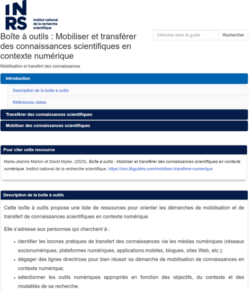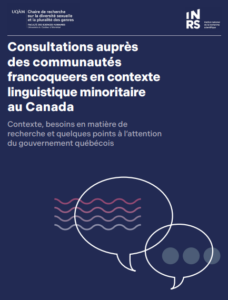
Areas of expertise
Participatory cultures , Digital culture , Digital methods , Digital platforms , LGBTQ+ issues
- Assistant Professor
- Affiliate Professor at the Department of Sexology, Université du Québec à Montréal
- Affiliate member of the Laboratoire sur la communication et le numérique (LabCMO) and of the Chaire de recherche sur la diversité sexuelle et la pluralité des genres (DSPG Chair).
- Member of the Association of Internet Researchers (AoIR).
Phone
514 499-4000
Email
david.myles@inrs.ca
Urbanisation Culture Société Research Centre
385 Sherbrooke Street E.
Montreal, Quebec H2X 1E3
Canada
Research interests
I am an Assistant Professor-researcher at the Centre Urbanisation Culture Société of INRS (Institut national de la recherche scientifique, Montreal). My research investigates the cultural, social and economic implications of digital platforms. It examines the role of digital platforms in mediating popular and participatory cultures, with a specific interest in LGBTQ+ cultures. The development of critical methods to study digitally-mediated phenomena is at the heart of my research interests, as well as the analysis of their ethical and epistemological implications.
Research affiliations: I am an Affiliate Professor at the Department of Sexology, Université du Québec à Montréal, where I am also an affiliate member of the Laboratoire sur la communication et le numérique (LabCMO) and of the Chaire de recherche sur la diversité sexuelle et la pluralité des genres (DSPG Chair). I am an active member of the Association of Internet Researchers (AoIR).
DescriptionMyles, D., Chanady, A., Margineanu-Plante, A. & Blais, M. (2024). Portrait qualitatif de la situation des personnes LGBTQ+ dans le milieu culturel au Québec (in French only). Target audienceAcademic, cultural, political, and community audiences Co-construction or partnershipThis report, the result of partnership research conducted with 13 Québec cultural organizations and 28 LGBTQ+ artists, paints a qualitative portrait of lesbian, gay, bisexual, trans, and queer (LGBTQ+) people working in the culture sector in Québec. More specifically, it looks at the realities of the main institutional actors affected by the inclusion of LGBTQ+ people working in the culture sector in Québec and the main issues encountered by LGBTQ+ people working in this sector, particularly in terms of equity, diversity, and inclusion (EDI). This project was funded by Ministère de la Culture et des Communications as part of the Québec government’s 2023–2028 action plan to fight homophobia and transphobia. See the publication: Portrait qualitatif de la situation des personnes LGBTQ+ dans le milieu culturel au Québec |
 |
DescriptionMarie-Jeanne Marion and David Myles. (2023) Boîte à outils : Mobiliser et transférer des connaissances scientifiques en contexte numérique (in French only). Institut national de la recherche scientifique. Target audienceAcademic, student, and community audiences Co-construction or partnershipThis toolkit provides a list of resources to guide approaches for mobilizing and transferring scientific knowledge in a digital environment. It is intended for those seeking to:
See the publication: Mobiliser transferer numerique |
 |
DescriptionSéguin, L.J., Blais, M., Myles, D. & Millette, M. (2024). Consultations auprès des communautés francoqueers en contexte linguistique minoritaire au Canada (in French only). Target audienceAcademic, community, and political audiences Co-construction or partnershipThis report is the result of partnership research conducted with ten community organizations in nine Canadian provinces and territories. It aims to identify the research needs of Francoqueer minority language communities and make recommendations to support these needs. This project was funded by Bureau de lutte contre l’homophobie et la transphobie of Secrétariat à la condition féminine as part of the Québec government’s 2022–2025 action plan for the Canadian Francophonie. See the publication: Consultations auprès des communautés francoqueers en contexte linguistique minoritaire au Canada |
 |
Publications
Collective book
Millette, M., Millerand, F., Myles, D. & G. Latzko-Toth. (2020). Méthodes de recherche en contexte numérique: Une orientation qualitative. Presses de l’U. de Montréal.
Articles in peer-reviewed journals
Myles, D. (2022). Grindr? It’s a ‘Blackmailer’s Goldmine’! The Weaponization of Queer Data Publics amid the US-China Trade Conflict. Sexualities: Special Issue on Sexual Datafication.
Duguay, S., Dietzel, C. & D. Myles. (2022). The year of the virtual date: Reimagining dating app affordances during the COVID-19 pandemic. New Media & Society.
Myles, D. & M. Blais. (2021). 10 petits hacks Tinder: Les algorithmes au service d’une économie spéculative des rencontres amoureuses et sexuelles. In Mondoux et al. (Eds). Logique algorithmique et reproduction sociétale, tic&société, 97-125.
Myles, D. & K. Lewis (2019). Constructing Injustice Symbols in Contemporary Trans Rights Activism. In Radomska, M. et al. (Eds). Queer Death Studies: Coming to Terms with Death, Dying, and Mourning Differently, Women, Gender & Research, no 3-4, 24-42.
Myles, D., Cherba, M. & F. Millerand. (2019). Situating Ethics in Online Mourning Research: A Scoping Review of Empirical Studies. Researching Intimacies and New Media: Methodological Opportunities and Challenges, Special Issue of Qualitative Inquiry.
Myles, D. (2019). ‘Anne Goes Rogue for Abortion Rights!’: Hashtag Feminism and the Polyphonic Nature of Activist Discourse. New Media & Society. https://doi.org/10.1177/1461444818800242
Myles, D., Benoit-Barné, C. & F. Millerand. (2018). ‘Not Your Personal Army’! Investigating the Organizing Property of Retributive Vigilantism in a Reddit Collective of Websleuths. Information, Communication & Society. https://doi.org/10.1080/1369118X.2018.1502336
Myles, D. & D. Trottier. (2017). Leveraging Visibility, Gaining Capital? Social Media Use in the Fight Against Child Abusers. Social Media + Society, vol. 3, no 1, 1-12.
Myles, D., Millerand, F. & C. Benoit-Barné. (2016). Résoudre des crimes en ligne. La contribution de citoyens au Reddit Bureau of Investigation, Réseaux, no 197, 173-202.
Myles, D. (2016). Utiliser les contributions d’internautes pour combattre le crime? Réflexion sur les enjeux conceptuels et éthiques du crowdsourced policing, Ethica, vol. 20, no 1, 193-222.
Thoër, C., Millerand, F, Myles, D. & V. Orange. (2012). Enjeux éthiques de la recherche sur les forums Internet portant sur l’utilisation des médicaments à des fins non médicales. Revue internationale de communication sociale et publique, vol. 7, 1-22.
Peer-reviewed book chapters
Myles, D., Duguay, S. & C. Dietzel. (2021). #DatingWhileDistancing: dating apps as digital health technologies during the COVID-19 pandemic. In Lupton, D. & K. Willis. (Eds) The COVID-19 Crisis: Social Perspectives. Routledge, 79-89.
Myles, D. (2020). Les rencontres amoureuses et sexuelles au temps des algorithmes: Une analyse comparative de Grindr et Tinder. In Piazzesi, C., Blais, M., Lavigne, J. & C. Lavoie Mongrain (Eds). Intimités et sexualités contemporaines: changements sociaux, transformations des pratiques et des représentations, Presses de l’U. de Montréal, 73-90.
Myles, D. (2020). Les bénéfices mutuels de l’ethnographie et de l’analyse du discours en contexte numérique. In Millette M. et al. (Eds). Méthodes de recherche en contexte numérique: une orientation qualitative, Presses de l’U. de Montréal.
Millerand, F., Myles, D. & S. Proulx. (2020). La redistribution des méthodes de recherche en contexte numérique: critique d’une cartographie. In Millette M. et al. (Eds). Méthodes de recherche en contexte numérique: une orientation qualitative, Presses de l’U. de Montréal.
Millerand, F., Heaton, L. & D. Myles. (2018). Les reconfigurations sociales de l’expertise sur Internet. In F. Claveau & J. Prud’homme (Eds) Experts, Sciences et Sociétés, Presses de l’U. de Montréal, 153-173.
Myles, D. & F. Millerand (2016). Mourning in a ‘sociotechnically’ acceptable manner: a Facebook case study. In Hajek, A., Lohmeier, C. & C. Pentzold (Eds), Memory in a Mediated World – Remembrance and Reconstruction, Palgrave Macmillan, 229-243.
Thoër, C., Millerand, F., Orange, V. & D. Myles. (2012). Se raconter et conseiller les autres sur les forums en ligne: la construction d’une identité d’expert en médicaments détournés. In C. Perraton, O. Kane & F. Dumais (Eds), Mobilisation de l’objet technique dans la production de soi, Presses de l’U. du Québec, 99-120.
Conference proceedings
Myles, D., & Blais, M. (2021). Top 5 tinder hacks! Blackboxing algorithms in the dating app industry. Association of Internet Researchers, Selected Papers of Internet Research.
Lewis, K., Berents, H., Myles, D., Cabalquinto, E. C., Fernández, A. M., & Estrada-Grajales, C. (2019). Performing (in)justice: The contentious politics of digitally mediated visuals. Association of Internet Researchers, Selected Papers of Internet Research.
Myles, David. (2018). ‘Anne goes rogue for abortion rights!’ Exploring discursive materialization across and beyond online platforms. Association of Internet Researchers, Selected Papers of Internet Research.
Myles, D., Trottier, D., Millette, M., Bonneau, C., Sergi, V., Casemajor, N., & Toupin, S. (2018). More than meets the eyes: The lens of visibility in internet research. Association of Internet Researchers, Selected Papers of Internet Research.
Colloquium organization
Myles, D. & C. Dietzel. (2022). Les enjeux du numérique pour les communautés LGBTQ+. Association francophone pour le savoir, May 12.
Millette, M., Myles, D. & G. Touir. (2016). Enjeux méthodologiques de la recherche sur les usages d’Internet et des technologies numériques. Association francophone pour le savoir (ACFAS), May 11-12.
